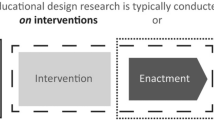Abstract
Recent concern about lack of scientific rigor in educational research has led to a reexamination of educational research methods. Methodology requires particular attention when researchers study learning in complex learning environments such as classrooms or computer-driven environments that simulate complex processes. This article reaffirms the importance of experimental research for answering some research questions. It argues that nonexperimental methods, such as design experiments and methods applied to the study of large-scale educational programs, such as randomized field trials, are useful for answering other kinds of research questions about learning in complex settings. This article discusses the validity of evidence gathered using these nonexperimental methods. Finally, it suggests that the study of the dynamics of learning can help integrate data from experiments that reveal details about learning and data from nonexperimental research that reveal how learning occurs in complex settings.
Similar content being viewed by others
References
Boruch, R., de Moya, D., and Snyder, B. (2002). The importance of randomized field trials in education and related areas. In Mosteller, F., and Boruch, R., (eds.), Evidence Matters: Randomized Field trials in Education Research, Brookings Institution Press, Washington, DC, pp. 50–79.
Brown, A. L. (1992). Design experiments: Theoretical, and methodological challenges in creating complex interventions in classroom settings. J. Learn. Sci. 2(2): 141–178.
Clark, R. E. (1983). Reconsidering research on learning from media. Rev. Educ. Res. 53: 445–460.
Cognition, and Technology Group at Vanderbilt (1997). The Jasper Project: Lessons in Curriculum, Instruction, Assessment, and Professional Development, Erlbaum, Mawah, NJ.
Cook, T., and Payne, M. R. (2002). Objecting to the objections to using random assignment in educational research. In Mosteller, F., and Boruch, R. (eds.), Evidence Matters: Randomized Field Trials in Education Research, Brookings Institution Press, Washington, DC.
Csiko, G. A. (1989). Unpredictability, and indeterminism in human behavior: Arguments, and implications for educational research. Educ. Res. 18(3): 17–25.
Howe, K. R. (1985). Two dogmas of educational research. Educ. Res. 14(8): 10–18.
Kulikowich, J. M., and Young, M. F. (2001). Locating an ecological psychology method of situated action. J. Learn. Sci. 10(1/2): 165–202.
Mayer, R. E. (2003). The case for evidence-based practice, and issue-driven research. Educ. Psychol. Rev. 15(4): 367–373.
Phillips, D. C. (1983). After the wake: Postpositivism in educational thought. Educ. Res. 12(5): 4–12.
Roth, W. M. (2001). Situating cognition. J. Learn. Sci. 10(1/2): 27–61.
Shavelson, R., and Towne, L. (eds.) (2002). Scientific Research in Education National Academy Press, Washington, DC.
Van Gelder, T., and Port, R. F. (1995). It's about time. In Port, R. F., and Van Gelder, T. (eds.), Mind as Motion: Explorations in the Dynamics of Cognition, MIT Press, Cambridge, MA, pp. 1–47.
Winn, W. D. (2002). Current trends in educational technology research: The study of learning environments. Educ. Psychol. Rev.14(3): 331–351.
Winn, W. D. (2003). Learning in artificial environments: Embodiment, embeddedness, and dynamic adaptation. Technol. Instr. Cognit. Learn. 1(1): 87–114.
Winn, W. D. (in press). Cognitive perspectives in psychology. In Jonassen (ed.), Handbook of Research on Educational Communications, and Technology (2nd edn.), Erlbaum, Mawah, NJ.
Winn, W. D., Windschitl, M., Fruland, R., and Lee, Y. L. (2002). When does immersion in a virtual environment help students construct understanding? In Bell, P., Stevens, R., and Satwitz, T. (eds.), Keeping Learning Complex: The Proceedings of the Fifth International Conference of the Learning Sciences (ICLS), Erlbaum, Mawah, NJ, pp. 150–170.
Author information
Authors and Affiliations
Corresponding author
Rights and permissions
About this article
Cite this article
Winn, W. Research Methods and Types of Evidence for Research in Educational Technology. Educational Psychology Review 15, 367–373 (2003). https://doi.org/10.1023/A:1026131416764
Issue Date:
DOI: https://doi.org/10.1023/A:1026131416764




